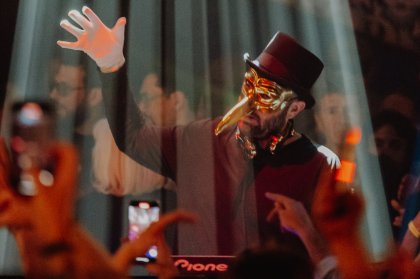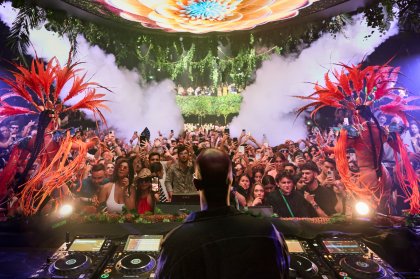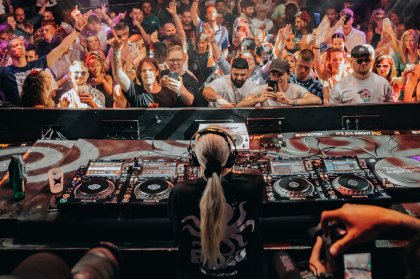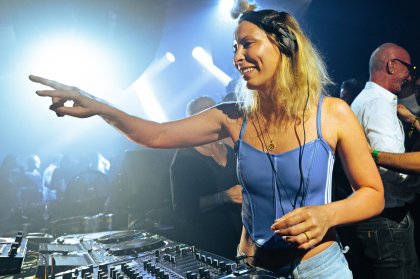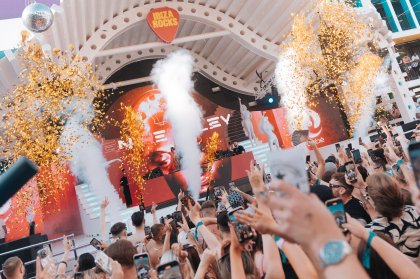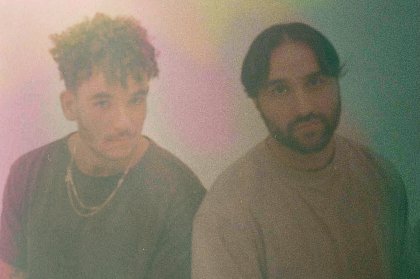This season sees Audiofly duo Luca Saporito and Anthony Middleton stretch their creative legs. Founders of the much-lauded and eclectic 'Supernature' label and its underground sister 'Maison D'etre', they have begun the summer with a flurry of well-received activity.
After 6 years spent travelling a more alternative globe, Audiofly have decided to bring their 'Flying Circus' concept to rest in Ibiza. The seminal residency of the party has found its home within the intimate spaces of Sankeys and shall host both the Basement and Spektrum rooms from July 12th to October 4th. The whimsical party - which prides itself on creating a journey through sound, sights and experiences - features a line-up, a style and an ideal that has not been seen before on the island.
Earlier this month, on June 12th Supernature released Kolors, a conceptual LP that explores the synesthetic relationship between music, colour and our individual perceptions of them. Featuring exclusively original tracks each artist was given the task of choosing a precise colour to represent their musical offering - encouraging a deeper investigation of their own inspirations and ideas.
The labels, parties and Audiofly themselves are renowned for moving beyond the music. They constantly try to deliver an output or experience that breaks the status quo - that offers more to the consumer. I caught up with Luca to examine their unique point of view, discuss their plans for the summer residency, and to take a look at the future...
The Flying Circus parties have been going for 6 years now yet you have never taken up a residency. Why did you feel that now was the right time to start a more static project, and why in Ibiza?
"Things - like many things in this world - have to mature before you can present them. Like a piece of fruit, you have to wait before you can eat it. You can't take a party to Ibiza and expect it to work if nobody knows the concept. Going around the world, taking the best venues we could, and the best artists we waited for the right opportunity to take a residency."
Why Sankeys?
"At the end of last summer after noticing the big success of the label - and the parties around the world - Ugur, the promoter of the night felt it was the right time to take it to the island. Sankeys approached us, we thought, 'why don't we do Flying Circus?' and that was it. For the most part of this year we have been working on the line-up, the concept and what to bring. We decided to do everything ourselves, throw all the cards in and bring Flying Circus to where it is supposed to be - a bigger stage."
You are known for your love of outdoor events. Sankeys offers a darker, more conventional clubbing experience, can we expect any open air departures over the season?
"We chose Sankeys because of the soundsystem and the intimate crowd. We are known for using outside venues, but we play with a very open concept - clubs are just venues we happen to use for our parties. If it's possible we are going to do one or two OFF events."
How important do you think having a super strong identity is for the success of the party around the world and on the island?
"In order to have the best possible concept for anything that you do - not just a night - it is important that you focus on the quality and the details. You can create a great night but that doesn't mean it will be successful over and over again unless you pay attention to the details - how to shift through times and give the crowd; the DJs; and everyone there the best possible experience."
What do you think about the current scene on the island?
"There is a climate of change on the island but if you look back year after year these changes are always there. Wherever you look, whatever you do in the world it is always changing. People complain about it, but without change there would be no enjoyment. Change is inevitable. It happens to human beings, it happens to everything and we must embrace it."
How did you go about planning the residency?
"We do things a bit more quietly, we do not blow trumpets left right and centre and we keep very close to our own identity. We chose to call it Flying Circus and not lean towards a new, big production idea because we wanted to concentrate on what we do best: the line-ups and the progression of the night from beginning to end."
You are bringing a diverse roster of artists featuring new talent and many live acts. As people are becoming more interested in new ways of musical presentation, how do you choose your line-ups?
"There is space for everything. With Flying Circus we are very interested in this free concept: we are interested in DJs, live acts and female DJs and the energy each creates. We choose our headliners very carefully, we spend time thinking, 'what have they done that is different from anybody else'.
For most people 'live' means being behind a laptop. There is a Martin Buttrich live which rocks the crowd no end, and then a James Blake live, in the true sense of the word where he plays keys with a band - people react differently to that. Dance music has reached the point where it is a mixture of everything. You need DJs, live sets, females, males; you need young people, old guards - a mixture of everything."
Why do you consciously book female DJs?
"It is the energy [of female DJs]. Females have the funk - and it brings and attracts crowds in a different way to males. When we started Flying Circus we booked Anja Schneider and you could tell that when she came on the energy was different. We made a conscious decision to book female DJs all the time because of that different energy."
How did the concept for the Kolors LP come about, was synesthesia something you were interested in before or did it happen more organically?
"It happened very organically. I'd been collecting tracks from various artists for over a year and ten I received a track by Julian Chaptal, 'Orange' - which is the opening track. It made me imagine a colour and the connection between music and colours is very apparent to me. The colour red has different forms, different shades, but in its essence it is still red. A track may be deep house or tech house but it is still house. It is the same with colours. Once I realised this, I asked each producer to choose a colour to represent their track and it created this collage - a kaleidoscope of music and colors."
The idea of linking music with more tangible things like colours, is that something you do yourself? How are you inspired?
"Music is an art form, and as such inspires other forms of art. I get inspired when I am cooking, if I smell something it can instigate this feeling of sound within me which I can take with me to the studio. Everything is interconnected, the way we feel, the way we are, the way we see the world. A piece of music becomes a lot stronger when visuals are added. It makes the music a million times stronger and it is something we will continue to explore in the future."
Is this fusion of the senses something we shall see in your residency, production wise?
"At the moment we are trying to see if the equipment that we have will allow us to go so deep. So far there is the possibility of going beyond anything we have done so far in exploring the link between music and imagery. We are trying to push the boundaries [of Sankeys lighting and sound system] to see what we can achieve."
Across the industry, compilations are becoming more rare. Why do you think this is and why does your buck the trend?
"Kolors wasn't born as a compilation and I would in fact be very weary to call it one. It is not mixed and every track is a complete original. For me, it is a conceptual exploration of an idea which has not been examined so deeply before. The compilations that I used to listen to were not collections of dance tracks. For me it was the people who did things differently. When you ask an artist to examine their inspirations, you don't have to be in a club, or high to listen to the product. It is timeless. It is the magic of hearing something you've never heard before, something deeper."
How would you like people to feel coming away from Flying Circus? Is it the idea of people experiencing something more than the music?
"For us, the most important thing is that people feel musically satisfied. That they have gone through a 365 degree journey through sound. That is why we book 365 degrees worth of artists.
Some may think one artist is too commercial, another that someone is too underground - but this is what we want. The vibe that you find at Flying Circus parties is a union between the artists and the crowd. Once the artist has finished playing he won't go home; he will stay with us; party with us and probably go and dance with the crowd. It is this feeling of family unity that has made the party so strong and I think it will be a breath of fresh air to Ibiza. I feel that our vibe is something the island needs badly."
In the future, is the idea [with Flying Circus] to get to the stage when you do not need to release a line-up because it is more about the party itself?
"It is not our ultimate goal, but it is something that we are already working on. To create a party concept which is totally beyond the line-up - people will come to the party and be surprised - is something that has always interested us. We wish to be beyond fads and trends and just do our own thing. It is the same with Audiofly and Flying Circus. We do not think, 'we are going to be part of this movement' and have been very careful not to fall into any particular style."
Are there any artists you are particularly excited to present in Ibiza?
"There are a million of them. We are very excited about Robag Wruhme, we have never had him before and I love his music. Also Agoria, and someone who is not so big but making very big waves - DJ Tennis. I am always very impressed with his style and how he mixes."
What is inspiring you currently? What is the future musical direction of Audiofly?
"I am very inspired by the idea of continuous discovery. Discovering new sounds, new artists, new synthesisers, a new way to make the same sound. The ultimate goal for me is this continuous search for something new, and Anthony will answer the same, it is very important to constantly find new ways of making music.
For me the constant search comes from the fact that we get very bored very easily. In order to be inspired it is important to seek out new boundaries. If you truly believe in your own discoveries then people will always follow you sooner or later."
On the island many DJs play similar music. For me it is important that artists want to give more, to express a deeper feeling rather than simply playing out records. Do you agree?
"I am not concerned with becoming the best DJ in the world, or by being accepted by everybody. I am concerned about finding new artists and sounds that I want to bring to a wider audience. I never understood the want of someone to be commercial, to convert to a sound that they do not believe in. It must affect you inside in ways that I cannot imagine, it must kill them inside - even though they would never admit it. If I play a track that is more for the crowd than it is for myself, then it stays with me for a few days and I need to get over it.
Many times I have played 'Total Africa' at the end of my set. Many people have tried to cut my head off, but at the same time when I play it I have witnessed many of the most beautiful moments in my career. People don't accept it - they cannot believe it. The secret of being a good DJ is getting the 'what the fuck?!' out of people, whether it be in a good or a bad way."
Flying Circus opens on July 12th at Sankeys featuring among others Audiofly, Carl Craig, Philip Bader and live performances from dOP and SIS. Tickets for all dates are available from Spotlight.
